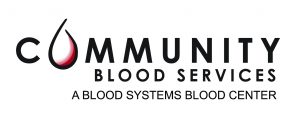The Need Is Real
An accident victim may need up to 50 units of red blood cells.
A cancer patient may require up to 8 units of platelets per week.
An organ transplant recipient may need up to 40 units of red blood cells, 30 units of platelets and 25 units of plasma.
One out of every three people will need blood at some time in their life. You never know when you or someone you love will be the one.
It takes 250 blood donations every day to meet the needs of all of the patients in the more than 30 hospitals we serve throughout New Jersey and New York. Volunteer donors who donate whole blood, platelets or plasma at one of our convenient donor centers or at a mobile blood drive help to ensure an adequate supply of blood and blood products are available for patients at our community hospitals. In an effort to meet those needs, Community Blood Services offers many different donation programs and services, including our automated collection program which targets specific blood products and blood types needed by our patients You can donate at one of our convenient locations or organize a drive at your place of business, place of worship, school, organization, or even on one of our bloodmobiles. It’s an opportunity to make a real difference in someone’s life.
Donating Blood is Safe
There is no risk of infection through giving blood. Every possible precaution is taken to protect the health of our donors, as well as the safety and availability of our blood supply.
Donating Blood is Simple
Giving blood at one of our many donation sites or on a mobile blood drive is convenient and easy. Our highly trained, courteous employees strive to make your blood donation a positive experience.
Donating Blood Saves Lives
A single blood donation can help save up to three lives. Blood can be separated into three components (red cells, platelets & plasma) and each component can we used to treat patients. It takes 250 blood donations every day to meet the needs of all of the patients in the many hospitals we serve throughout New Jersey and New York.
Anyone in Good Health Can Donate Blood
- Donors must be at least 16 years old (16- and 17- year-olds must have signed parental consent forms and proof of age).
- Click here to display the Parental Consent Form in English.
- Click here to display the Parental Consent Form in Spanish.
- Donors must weigh at least 110 pounds.
- Medications frequently taken by healthy individuals, such as aspirin, thyroid, diabetic and blood pressure medications, are not reasons for deferral. All medications will be evaluated with the blood center staff prior to donating.
- Donors must show a picture ID, i.e., a driver’s license.
- Donors must eat a good meal and drink plenty of fluids before donating.
Donate Double Red Cells
Red Blood Cells carry oxygen to all parts of the body. They are most needed after significant blood loss through surgery or anemia. Donors can donate red blood cells up to 4 times per year. O negative is the universal red cell donor.
Donate Platelets
Platelets are essential for blood clotting. They are routinely needed to support cancer therapy, open-heart surgery, blood disorders and organ transplants. Platelets must be transfused within 5 days, requiring the supply to be constantly replenished. Donors can give platelets up to 24 times per year.
Donate Apheresis Plasma
Plasma is the liquid portion of the blood containing critical clotting factors. Plasma is used to treat patients with certain bleeding disorders and for plasma exchanges. Plasma can be given every 30 days. AB is the universal plasma donor.
Donation Process
Upon arrival to a donation site, you will be asked to present a photo ID with your signature. Current demographics will be verified and/or updated in the system and your photo will be taken for future identification. After answering a series of medical and travel related questions, a health screening will be performed. If all eligibility requirements are met, you will then be ready to donate.
Donating usually takes less than an hour however; it will take longer if you are donating automated products.
Click here for donor eligibility guidelines.
Click here to find a donor center near you.
Click here to locate a blood drive in your area.
Post Donation Instructions
After your donation, PLEASE REMEMBER to:
- Eat and drink before leaving the donor area
- Drink extra fluids for the next 24 hours
- Refrain from smoking for at least one hour
- Refrain from drinking alcohol for at least 24 hours
- Keep your bandage on for four hours
- Avoid heavy lifting for the remainder of the day
- Apply ice for about 15 minutes if bruising occurs
- Apply direct pressure to needle site and raise arm if bleeding occurs
- Sit or lie down if dizziness occurs until the feeling passes
If you experience flu-like symptoms, fever or increased pain or swelling at the needle site over the next 72 hours, feel your blood should not be used for ANY REASON or have any other questions about your donation, please contact us at 201-389-0417.


